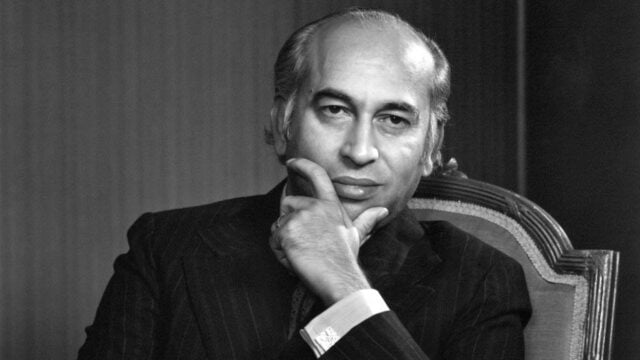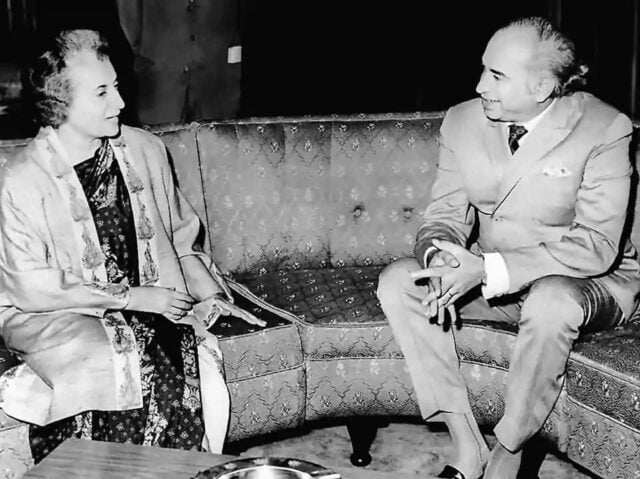Back in Time is ED’s newspaper-like column that reports an incident from the past as though it has happened just yesterday. It allows the reader to relive it several years later, on the date it had occurred.
5 April 1979, Pakistan
Pakistan is in utter dismay and sorrow today as the news of the execution of deposed Prime Minister Zulfiqar Ali Bhutto came out. People are in shock because Bhutto was widely respected and honored by the public.
He was born at Larkana in the province of Sind on January 5, 1928. He spent his last birthday, his 51st, in the cell of Rawalpindi jail, being scarcely able to eat. Bhutto was a charismatic, Western-educated leader who ruled Pakistan from 1971 to 1977.

The interior ministry announced that the deposed prime minister was hanged in the Rawalpindi Central Jail at 2 am. The ministry also informed that he was buried in the family graveyard at Naudero (in Sind) at 10:30 am.
When the burial took place, two of his uncles and his first wife, Amir Begum, whom he had married at 13, were present.
What Is Happening?
Bhutto was convicted on March 19 last year by the Lahore High Court on charges of organizing and carrying out a political murder. The four others, who were sentenced to death along with him, are still alive. Their cases are “still under review”, said an official spokesman in Islamabad.
President Zia-ul-Haq was the army commander who overthrew Bhutto in 1977. Zia rejected all appeals from Pakistan and other countries, seeking mercy for the convicted leader.
Nusrat Bhutto, Bhutto’s second wife, and his elder daughter, Benazir, are under preventive arrest. World leaders like US President Jimmy Carter and Soviet President Leonid Brezhnev had sent mercy appeals to Zia.
Indira Gandhi expressed shock at the execution of Bhutto. She said that it was obvious that Bhutto had become “victim of a conspiracy of certain vested interests within and outside Pakistan.”

Also Read: The Plight Of 1971: India Released 93,000 Pakistani POWs But Indian POWs Were Never Returned
Nearly 500 Bhutto supporters defied the martial law regulations today and were shouting anti-government slogans and battling the police in Liaqat Park.
The crowd was heard shouting “Revenge, revenge, revenge.” Some women shouted and taunted the police, “Shame on you, you couldn’t save him.” One man even warned that “Now this country will be like Iran.”
The government officers wept openly, but violent demonstrations are happening in the heavily Muslim Indian state of Kashmir, which borders Pakistan.
Post Scriptum
Zulfiqar Ali Bhutto had a deep mistrust and hatred towards India. That might be because India was seen as a threat. But somehow, Bhutto was able to strike a sympathetic chord with people in India. This was, partly, because he was the lesser evil.
Zia ul Haq’s decision to execute Zulfiqar Ali Bhutto in 1979 is seen as a significant turning point in Pakistan’s history. It is like a clue to understanding the terrible turns that Pakistan took towards Islamic militancy.
We would have seen a more positive picture of Pakistan if Bhutto had not been executed. It is possible that the story of India-Pakistan relations could have been normal.
Forty-two years is too brief for a country to know where it is headed in the future. Pakistan saw history repeat itself many times but has it learned from those mistakes? Well, this question is a difficult one to answer.
Image Credit: Google Images
Sources: The Indian Express, The Hindustan Times, The Washington Post, The Guardian
Find The Blogger: @PrernaMagan
This Post Is Tagged Under: Zulfiqar Ali Bhutto, Zia ul Haq, Pakistan, the execution of Zulfiqar Ali Bhutto, Who executed Bhutto, Why was Bhutto executed, India and Pakistan relations, Indira Gandhi, Mahatma Gandhi, Jawaharlal Nehru, Rajiv Gandhi, Narendra Modi, Prime Minister, President, Independence, a Black day for Pakistan, Islamic Militancy, Religion, Government
Other Recommendations:
Pakistan Celebrates Women’s Day With Their Historic ‘Aurat’ March































